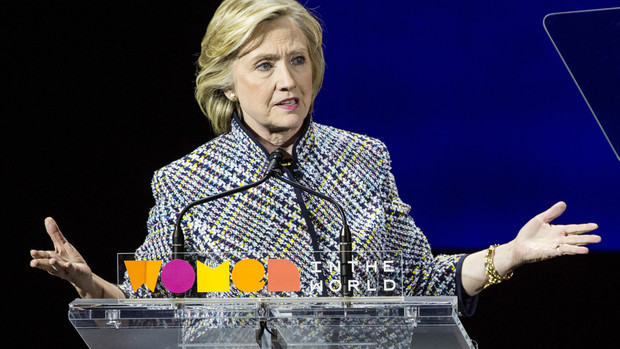What the Clintons Haven't Learned
By Megan McArdle
BloombergView.com

What, me
worry?Photographer: Andrew Burton/Getty Images
Tuesday will be the unveiling of what can be breathlessly awaited only in campaign season: a book on the Clinton Foundation, and allegations of a torrent of sleazy foreign cash that has poured into its coffers. I'm already on record as saying that the author, Peter Schweizer, might struggle to meet the burden of proof to show that the Clintons absolutely and unquestionably did something wrong. On the other hand, there's a lower burden of proof for "raises unsettling questions that will dog Hillary Clinton through a tough campaign," and that may already have been met.
The great mystery that remains is how this could have happened. The Clintons have known for a long while that Hillary would be running in 2016. And they ought to have known that accepting foreign donations, from folks who wanted things from the State Department, would become a problem for her candidacy. They certainly should have been aware that funneling all of her State Department e-mails through a private server, and then destroying them, would create terrible optics for her campaign and fuel any subsequent scandals. Why, then, did two such tenacious, wily campaigners proceed with this nonsense?
It looks to me like the answer is that they somehow didn't know the things that they should have known. They certainly act surprised. The campaign machine that used to blast away at incipient scandals with the white-hot fury of a thousand suns now lets them fester for weeks before offering a lame response: Hillary's press conference about the e-mails gave critics more fodder, and Bill's non-response response to questions about foundation finances is even worse. The former president told NBC that he has to keep giving high-priced speeches all over the world because "I gotta pay our bills." Coming from a man reputed to be worth tens of millions, who gave his daughter a multi-million-dollar wedding, this seems a bit ... off.
Which makes me wonder if the famed Clinton campaign skills aren't a little bit out of date. The Clintons just don't seem prepared for the modern media world and its tendency to relentlessly pry away at the smallest details. In the end, this may be a bigger problem for the Clinton campaign than whatever Schweizer's book reveals.
Bill Clinton was the first presidential target of an Internet scandal. You would think that this would make the Clintons keenly aware of the web's dangerous powers, the way it ferrets out hidden secrets and blows past official gatekeepers to plaster those secrets on computer screens across the country. And yet, Bill Clinton survived and even thrived after the Saga of the Blue Dress. Perhaps that taught the Clintons to just stonewall and wait for Republicans to overreach.
This was the wrong lesson to take away. Yes, Republicans overreached in the impeachment, and they might again. But the current question is not a tawdry sex scandal with only tangential relation to Clinton's political duties; it is a financial scandal that raises questions of selling political influence (the kind that have been raised before about the Clintons). The even greater difference is that the Internet of today is not like the internet with which the Clintons contended in the late 1990s. That was a kinder, gentler beast -- in large part tamed by the huge economic boom that short-circuited the nation's interest in vilifying Bill Clinton. The Monica Lewinsky scandal might have turned out very differently in today's economy.
Too, the web during the Clinton administration was a set of static pages of relatively limited reach. Today every foundation tax return, every corporate giving report, every press release for every speech that Bill Clinton has made, is available to any random person who wants to put in a few moments at a computer. When the Drudge Report broke the "news" of Monica Lewinsky's dress, it was a David-and-Goliath story. But as Glenn Reynolds has written, the powerful now face an army of Davids -- or maybe the better analogy is a militia, that forms up any time something interesting stumbles into its territory. This is not just a difference in scale; it is a difference in kind.
I suspect that one reason the Obama administration has been relatively free of scandals is that its officials get the Internet. Really get it, down in their bones. The campaigners who used technology so powerfully also understands how it can be deployed against them, and so they seem to have minimized the number of not-quite-secrets available for sleuths to uncover. The Clintons clearly understood that there was a threat, which is why one presumes that Hillary's e-mails were shielded from FOIA requests. But that also looks like a tacit confession that the Clintons didn't really understand what they were dealing with.
The Watergate scandal taught every post-Nixon president not to record conversations. The Lewinsky scandal taught the Clintons not to leave evidence where the public can find it. What they should have learned is that there is no such thing as keeping your business out of the public eye any more. Everything you do leaves a trail, and there are too many freelance Woodwards and Bernsteins out there who will follow it wherever it leads. Since you can't keep them out, the best you can do is to avoid going anywhere that might interest them.
Now instead of a mini-scandal over some badly
phrased e-mails that would have blown over in a few
days, the Clintons have a lingering issue of unknown
scale. But that's not the main problem for the
campaign. The most serious concern at the moment is
whether there are any other trails of breadcrumbs,
and where they might lead.

